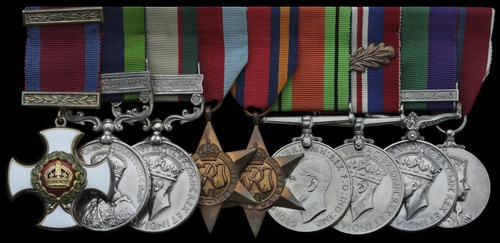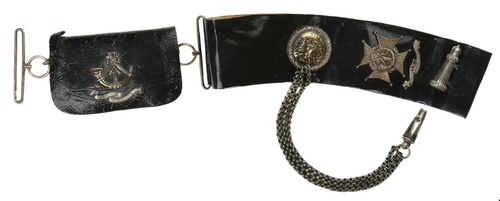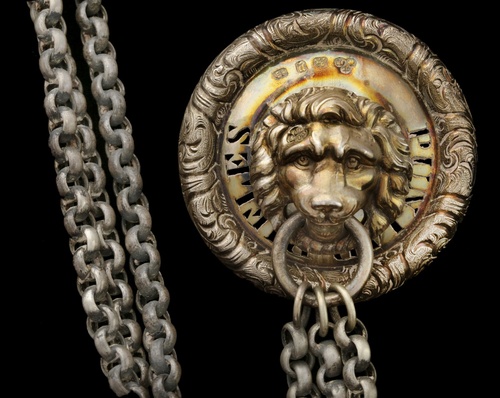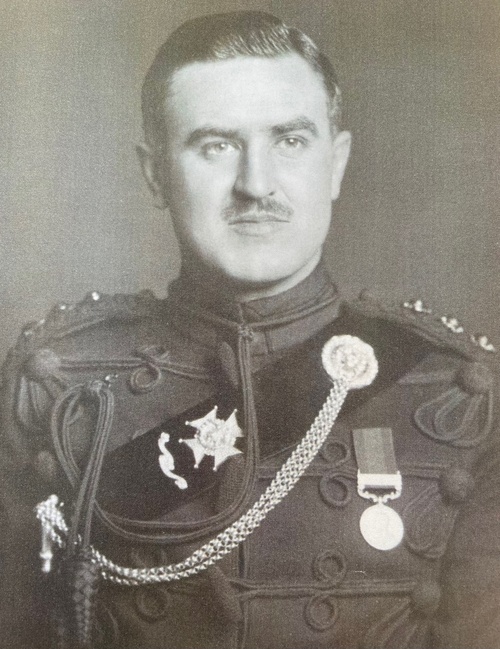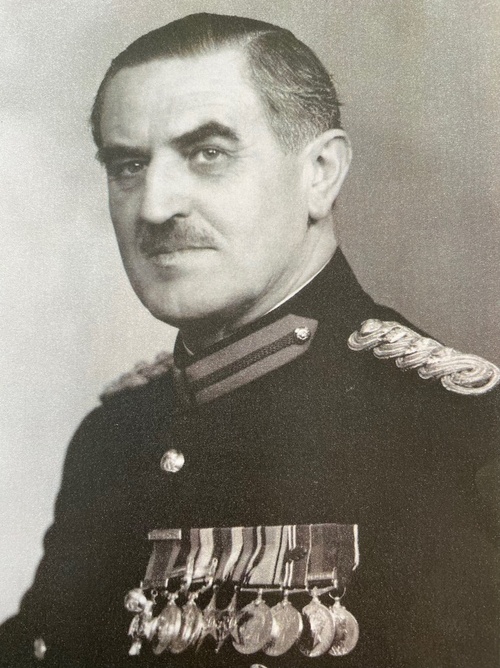Auction: 22003 - Orders, Decorations and Medals
Lot: 441
Sold by Order of a Direct Descendant
A very fine 1946 'Burma operations' D.S.O. group of nine awarded to Lieutenant-Colonel E. C. Pickard, 13th Frontier Force Rifles, Indian Army, later Royal Artillery
Distinguished Service Order, G.VI.R., the reverse of the suspension bar officially dated '1946', top riband bar adapted for mounting; India General Service 1908-35, 1 clasp, North West Frontier 1930-31 (2-Lt. E. C. Pickard, U.L.); India General Service 1936-39, 1 clasp, North West Frontier 1936-37 (Lt. E. C. Pickard, 1-13 F. F. Rif.); 1939-45 Star; Burma Star; Defence and War Medals, with M.I.D. oak leaves, these last four impressed 'A1. 444 Lt. Col. E. C. Pickard. F. F. Rif.'; General Service 1918-62, 1 clasp, S. E. Asia 1945-46 (Major. E. C. Pickard. D.S.O. R.A.); Coronation 1953, mounted as worn, good very fine, in fitted leather case by Spink & Son (9)
D.S.O. London Gazette 12 March 1946. The original Recommendation - submitted in the Field on 7 November 1945 - states:
'For outstanding service and continuous gallantry in action.
Throughout the campaign from January 1945 onwards Lt.-Col. Pickard has been an inspiration to his Battalion.
In the absence of his Commanding Officer he Commanded the Battalion at the crossing of the Irrawaddy at Myinmu. Immediately after the bridgehead had been established his Battalion was attacked with the greatest ferocity by the Japanese for seven successive nights. His cool and determined leadership was largely instrumental in the Battalion holding its ground against great odds and in so inflicting a severe defeat on the enemy.
Such was the spirit he inspired that within ten days the Battalion was attacking the Japanese with the greatest dash having suffered over 25% casualties.
He again took over Command of the Battalion at the beginning of May 1945 and from then until the end of mopping-up operations in July 1945, it was again due to his inspiring leadership that the Battalion continued to fight with the greatest dash and enthusiasm despite six months of hard and wearisome fighting.'
Edward Cecil Pickard was born at Cairo on 3 May 1909, the son of Lieutenant-Colonel E. Pickard O.B.E., D.C.M., Green Howards. Young Pickard was educated at Dean Close School, Cheltenham from 1922-27 and thence went up to the Royal Military Academy Sandhurst. He excelled there and took the Norman Medal upon passing out in August 1929, when he was 1st Place in the Cadets going into the Indian Army and 2nd overall.
Pickard was commissioned onto the Unattached List and was posted to join the 2nd Battalion, Durham Light Infantry, joining the unit at Sialkot and given command of 6 Platoon, 'B' Company. He went with his unit to Razmak and thence was present with RAZCOL, which went up onto the North West Frontier from 16 March-6 August 1930 (Medal & clasp). He joined the 1st Battalion, 13th Frontier Force Rifles (Coke's Rifles) on 27 October 1930 at Ambala and was advanced Lieutenant on 29 November 1931. Made Battalion Quartermaster on 3 December 1933, he served as Adjutant from 5 April 1936-24 December 1937 and again saw active service on the North West Frontier from 19 July-16 December 1937 (Medal & clasp). Promoted Captain in August 1938, he was a Company Commander by the outbreak of the Second World War.
Remaining with the 1st Battalion in India in the first few years of the War, he proceeded to Jhansi in March 1941 to assist in the raising of a new 14th Battalion of the unit, being the Second-in-Command. Having trained the Battalion for active service, they had been expecting to make for the Middle East in November 1941 but instead found themselves in Ceylon. They were soon digging trenches and undertaking jungle training, with Pickard being Acting Lieutenant-Colonel in April 1942, the same month the Japanese bombed the harbour. Whilst his unit suffered no casualties, they were tasked '...clearing after pretty messy'. Returing to be 2-i-C in August 1942, he was again in Command from February-March 1943. Pickard saw further training and a Staff appointment in the proceeding period but was always returned to his unit, awaiting the call to the front. That finally came in January 1945, being flown forward to Shwebo at the end of the month and it was from 7 February that their own planning for the important Irrawaddy crossing began. Their crossing took place on 0430hrs on 13 February with Pickard in Command, the aim for his unit being the objective of Kanlan Ywathit. A fierce fight followed but they eventually won out on 19 February.
It was during the course of the fighting, that Jemadar Prakash Singh Chib was put forward for a posthumous Victoria Cross by Pickard. His citation gives some flavour of the actions which his unit shared:
'At Kanlan Ywathit, in Burma, on the night of 16th/17th February, 1945, Jemadar Prakash Singh was in command of a platoon of a rifle company occupying a company defended locality. An hour before midnight the Japanese launched a series of fierce attacks, the main weight of which was directed against Jemadar Prakash Singh's platoon. Within the first half hour, he was severely wounded and was unable to walk. His company commander ordered him to be relieved, but a short time afterwards his relief was wounded, and he crawled forward and again took command of his platoon sector. In turn he fired the platoon's 2-inch mortar, the crew of which had been killed, and the machine-gun belonging to a section all of whom were casualties. At this stage he was once more badly wounded in both legs, but continued to drag himself about by his hands. He re-grouped the remnants of his platoon around him so that they successfully held up a fierce Japanese charge. Nearly three hours after the Japanese attacks began, Jemadar Prakash Singh was wounded for the third time in the right leg, but though so weak from loss of blood that he could not move and was obviously dying, he continued to direct and encourage his men, and so inspired the company that the enemy were finally driven out from the position.'
That award was approved to Pickard on 15 April 1945. On 30 May 1945 he was given Command of the 14th Battalion, in his own words '...for keeps this time!' From 31 May-27 August he was involved in the '...heavy cut-off Ops against retreating Japs' - being rewarded with his D.S.O. and a 'mention' (London Gazette 9 May 1946, refers) for his part in the campaign.
Appointed Brigadier in charge of 100 Indian Infantry Brigade, he was present at the signing of the Japanese surrender at Rangoon on 13 September 1945. With the end of the Second World War, time was not up for Pickard and he was swiftly shipped up to Saigon, passing over 100 Indian Infantry Brigade and resuming Command of the 14th Battalion '...moving northwards towards main Jap concentration area and establish Group HQ in Bien Hoa from where mobile column Ops and Japanese surrender ceremonies were conducted. I command Group in Bien Hoa. He left the theatre on 9 February 1946 and at Midnight on 15 April 1946, the 14th Battalion, one which he had raised, was disbanded after five years and 15 days of War Service.
Transferred to Delhi, he took part in typical post-War work and was made Major on 1 July 1946, signing on for the British Army on 30 November 1946, being confirmed in his first choice of joining the Royal Artillery. He left India on 22 February 1947 and joined the Depot at Woolwich after nearly 18 years of service to the Indian Army - going up to Buckingham Palace on 8 July 1947 to be invested with his D.S.O. by The King. He would be Battery Commander of 213 Battery, 78 Search Light Regiment at Blandford from 28 July 1947-6 January 1948, in his own words '...what a start!' At his Regimental Guest Night on 17 March 1948, as the Senior Transferee at the Artillery Mess at Larkhill, Pickard sat between Field Marshal Alanbrooke and the Master Gunner, Major-General Nicholson. Promoted Lieutenant-Colonel in January 1952 and Colonel in October 1956, Pickard retired on 30 November 1961.
Sold together with a most impressive archive of original material comprising:
(i)
Bestowal Document for the D.S.O., together with invitation to Investiture and envelope.
(ii)
M.I.D. certificate, with its forwarding letter and in postage envelope.
(iii)
Certificate for the 1953 Coronation Medal, in its envelope.
(iv)
Invitation to Regimental Guest Night at Larkhill.
(v)
Copied career biography, written by the recipient, together with copied research and two photographs.
Also to be offered with the following militaria and insignia:
(vi)
His Officer's dress sword, the blade embossed 'E.C.P. Frontier Force Rifles' and 'C.E.P. R.A.', these latter details those of his son, who also used this sword during his period of service (as an officer in the Royal Artillery), together with both Full Dress and Service leather scabbards, two sword guards, two sword hilt handles and all housed in its leather bag, this embossed 'E.C.P.'
(vii)
His 1st Punjab Rifles cross-belt, silver fittings all hallmarked 'J & Co.', Birmingham, lion for 1898, whistle and remainder for 1897, leather pouch with 'home-made' leather and fabric cross-belt.
Subject to 20% VAT on Buyer’s Premium. For more information please view Terms and Conditions for Buyers.
Sold for
£4,000
Starting price
£2500

